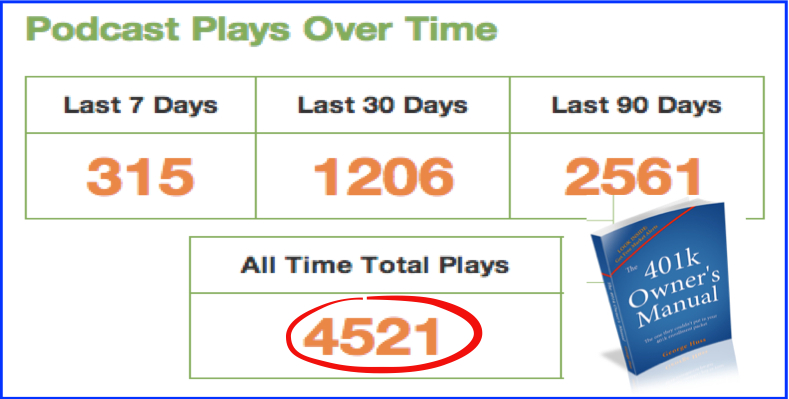Do You make these mistakes in Your 401k
 ***
***
***
For many of us the money we put into our 401k and the money we grow there will be a primary source of funds to see us through our retirement however we may envision it. The more I talk with people about their accounts the more I see common pitfalls that are easily avoided.
1. Looking for direction in the rear view mirror.
***
A simple truth that is often overlooked is that the market is stronger than good intentions or genuine desires. There is no doubt in my mind that you, your family, the State and Federal government and your employer all want you to have a successful retirement. There are good intentions and genuine desires all around that outcome. However, the one key player in determining that outcome simply does not care – The market.
***
Many people look at the mutual funds offered in their plan and focus on historical returns: one year, five year and ten year and think those returns should continue. They have been surprised and even angry the last dozen years.
***
The simple truth is the market does not care what you believe. It is what it is on any given day and through any given cycle. The mutual fund industry, which dominates the 401k space promotes the buy and hold investment philosophy. Why? Because it is profitable for them. Yet, a 115 year look at the market shows there have been four bull markets and four bear market cycles. Investment strategies that work in a bull market (buy and hold) do not necessarily work in a bear market.
***
One study suggests we are only 12 years into the current bear market cycle, the previous ones lasting 17 years, 25 years and 18 years. How long will this one last? The required regulatory language, which is correct, says: Past Performance is No Guarantee of Future Results. A new study done in early 2012, which polled the major consultants to the 401k industry, reported no firms are anticipating higher investment returns or lower volatility going forward. So, looking for direction in the rear view mirror will not be of much help.
***
2. Ignoring fees.
***
I’ve been involved in the securities industry for thirty plus years. I’ve seen things I wish I had not. And I’ve seen things I wish were not true. On the subject of fees, my experience has been that fees are easy to ignore when markets are rising and account values, like boats in a marina, are rising with the incoming tide. Yet, when the tide is going out, a laser like focus is directed at fees. It is just human nature. But, fees are always important – and need to be viewed in perspective.
***
It is not the fees themselves that are drivers of performance. It is the value received that drives your account balance. The lowest cost fees will not help if they reflect the value of what is offered. Which would you prefer: Low fees and poor performance, low fees and mediocre performance or low fees and great performance? Keep the focus on fees in perspective.
***
Many plans are now offering a self directed brokerage account platform within the 401k. I have seen some that simply offer more mutual funds to the employee; and, I have seen some that offer Exchange Traded Funds (“ETFs”). The most notable benefit of ETFs is their lower cost structure. If this is a choice available in your plan, seriously consider making the change.
***
3. Letting investing inertia take over.
***
In my experience, this is THE mistake which is most common. Someone once told me: “the confused mind always says – no.” It is no wonder this is the most common mistake of them all. Markets are confusing – even to the experts! If any investment professional tells you otherwise, I would suggest they are not being honest – if only with themselves.
***
As I mentioned, I believe we are 12 years into a cyclical bear market. Any number of articles have been written about the death of buy-and-hold. Investors in this type of market should be vigilant and nimble if they genuinely want to retire someday. It is easy to let inertia take over when the 401k plan structure basically forces employees to moonlight as investment experts.
***
Some suggestions:
-
Go online and set up alerts on the investments you own.
-
Set the alerts within some range so that you are not getting alerts every day.
-
Stop watching or listening to the talking heads on the financial “news” (news is not important. How your investments react to the news is important; and, it will be reflected in the price. If it is significant you will see it in the alerts you have set-up.
-
Do not try to anticipate what the market will do.
-
Review your account statements at least once per quarter.
***
Want more?
Enjoy unlimited access to 7 short, video tutorials which will quickly take you step-by-step through this easy process. Videos range in length from 4 to 13 min. averaging about 10 min. Just click here.
 ***
***




